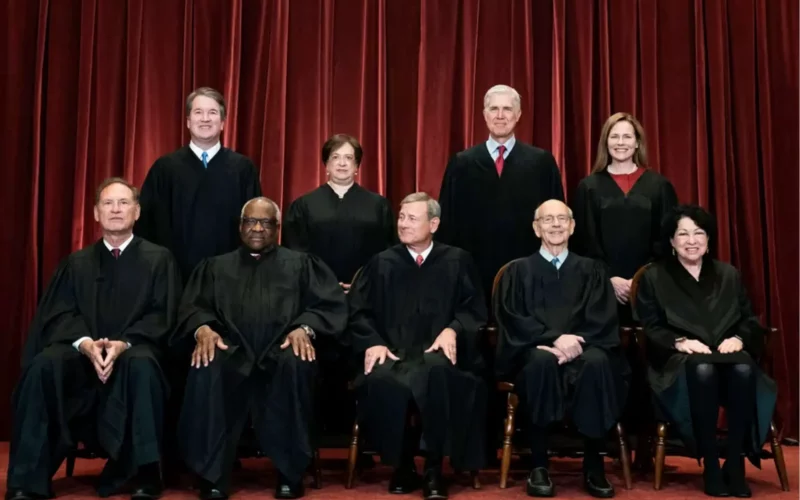Colorado Supreme Court Justice Carlos Samour, who wrote one of three stinging dissents to the Anderson v. Griswold ruling against Trump, may have provided a “roadmap” for the United States Supreme Court to reinstall the 45th President and GOP frontrunner to the state ballot in 2024.
The Colorado Supreme Court found in a controversial 4-3 ruling that Trump “violated” the 14th Amendment, which states that anybody in a high government post who “rebels against the Constitution” is disqualified from holding public office in the future.
Despite the fact that Trump was exonerated of insurrection charges during his impeachment trial and was never formally charged with “insurrection” under US law, the court issued the politically charged decision.
That is the substance of Justice Samour’s dissent and the likely path SCOTUS may pursue in the future to decide in Trump’s favor.
“Our government cannot deprive someone of the right to hold public office without due process of law. Even if we are convinced that a candidate committed horrible acts in the past—dare I say, engaged in insurrection—there must be procedural due process before we can declare that individual disqualified from holding public office. Procedural due process is one of the aspects of America’s democracy that sets this country apart.”
“The decision to bar former President Donald J. Trump – by all accounts the current leading Republican presidential candidate (and reportedly the current leading overall presidential candidate) – from Colorado’s presidential primary ballot flies in the face of the due process doctrine.”
“Significantly, there is a federal statute that specifically criminalizes insurrection and requires that anyone convicted of engaging in such conduct be fined or imprisoned, as well as disqualified from holding public office,” Samour writes. “See also 18 U.S.C. 2383.”
“If any federal legislation arguably enables the enforcement of Section Three, it’s section 2383. True, President Trump has not been charged under that statute, so it is not before us. But the point is that this is the only federal legislation inexistence at this time to potentially enforce Section Three. Had President Trump been charged under section 2383, he would have received the full panoply of constitutional rights that all defendants are afforded in criminal cases.”
Attorney Viva Frei summarized the many ways that the Colorado court ruling violates due process.
1) Trump was never convicted of “insurrection” 2) No one involved in Jan. 6 was convicted of “insurrection” 3) Trump was never charged with “insurrection” 4) No one involved in Jan. 6 was charged with “insurrection” 5) Trump was acquitted on the 2nd impeachment on charges that…
— Viva Frei (@thevivafrei) December 20, 2023
Frei writes on X:
1) Trump was never convicted of “insurrection” 2) No one involved in Jan. 6 was convicted of “insurrection” 3) Trump was never charged with “insurrection” 4) No one involved in Jan. 6 was charged with “insurrection” 5) Trump was acquitted on the 2nd impeachment on charges that related to the events of Jan. 6 6) The 14th Amendment Sec. 3 does not apply to the President.
That is all anyone needs to understand.
Furthermore, Frei provided a number of “absurd” passages from the ruling.
2/2 pic.twitter.com/vW6v7Z0yGe
— Viva Frei (@thevivafrei) December 21, 2023
In the ruling, the court acknowledges, and then elides, that the “insurrection” definition that the judges ruling in favor of striking Trump from the ballot prefer does not apply to the president.
Constitutional scholar Jonathan Turley blasted the Colorado court’s decision.
Turley has had enough:
“When I read the 14th amendment, I see the words insurrection or rebellion. This was neither. This was a riot. Most people in the public can see it that way.” pic.twitter.com/exguiWdHgu
— Citizen Free Press (@CitizenFreePres) December 21, 2023
“When I read the 14th amendment, I see the words insurrection or rebellion. This was neither. This was a riot. Most people in the public can see it that way,” he said.
Turley also wrote a lengthy article explaining what the Supreme Court should do with the Colorado ruling.
After the Civil War, House members were outraged to see Alexander Stephens, the Confederate vice president, seeking to take the oath with an array of other former Confederate senators and military officers.
They had all previously taken the same oath and then violated it to join a secession movement that claimed the lives of hundreds of thousands of Americans.
That was a true rebellion.
January 6, 2021, was a riot.
That does not excuse those who committed crimes that day — but it was not an insurrection.
The majority on the Colorado Supreme Court adopted sweeping interpretations of every element of the decision to find that Trump not only incited an insurrection, but can be disqualified under this provision.
It does not matter that Trump has never been charged with even incitement or that he called for his supporters to go to the Capitol to protest “peacefully.”
In finding that Trump led an actual insurrection, the four justices used speeches going back to 2016 to show an effort to rebel before Trump was ever president.
There are ample grounds to summarily toss this opinion to the side.
However, that would not answer the call of this historic moment.
What these four justices did was a direct assault on our democratic process in seeking to bar the most popular candidate in the upcoming election.
Harvard law professor emeritus Alan Dershowitz also slammed the ruling.
Alan Dershowitz is fed up:
“In the sixty years I’ve been practicing and teaching law, I’ve never seen a decision that is so antidemocratic and so unconstitutional. It is absurd.” pic.twitter.com/Y1XQyhkI6W
— Citizen Free Press (@CitizenFreePres) December 20, 2023
“In the sixty years I’ve been practicing and teaching law, I’ve never seen a decision that is so antidemocratic and so unconstitutional,” he said. “It is absurd.”
It is absolutely absurd. But we are now living in absurd times. How the Supreme Court will ultimately rule in this crumbling former constitutional republic is anybody’s guess.

